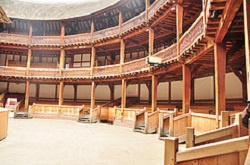As evidenced by Adele Devine’s superb piece on teaching Shakespeare, there’s clearly something about the playwright’s work that gets teachers all fired up. With the birthday of William Shakespeare getting closer, teacher and manager of Arts on the Move Alison Chaplin brings us her finest tips on enthralling your class in this world, and having a great time while you’re at it.

This April we commemorate Shakespeare’s 450th birthday, and hundreds of primary school children across the country will join in this momentous occasion by taking part in organised celebrations. However, a great number of primary school teachers already celebrate Shakespeare in their own way. Schemes of work that explore Macbeth or Romeo & Juliet are already fully integrated into the Primary Framework for Literacy objectives in many primary schools, with teachers attacking the stories, characters and themes with gusto. But for every teacher who loves tackling Shakespeare, there are many who don’t. The literary experiences we have as children, when we first encounter the beautiful Bard, can either make us or break us for life. But, fear not, for help is out there…
My advice when approaching Shakespeare in the primary school is to introduce it by stealth. Find ways of catching the attention of the children and drawing them in to the whole story. For example, describe a specific setting for a scene from a play – a good one is Act 3 Scene 3 from Macbeth - the murder scene*. As far as setting descriptions go there isn’t much information to be found in the text, but some clues are there and what isn’t specified you can surmise (or make up!): it’s night time; a faint torch light can be seen, held by an unseen hand; the setting is a park near the palace, there are trees casting shadows, low bushes and rocky outcrops; the sky is full of rain clouds; it’s spooky.
This April, why not throw a surprise 450th birthday party for Shakespeare, with decorations, cake, the lot? Create an afternoon that will stand out in their memories forever. Inspire them! What could they do with their lives? Shakespeare did not start out with pots of money. He used education, life experience and imagination to create stories we still relate to.

A community-driven platform for showcasing the latest innovations and voices in schools
Pioneer House
North Road
Ellesmere Port
CH65 1AD
United Kingdom